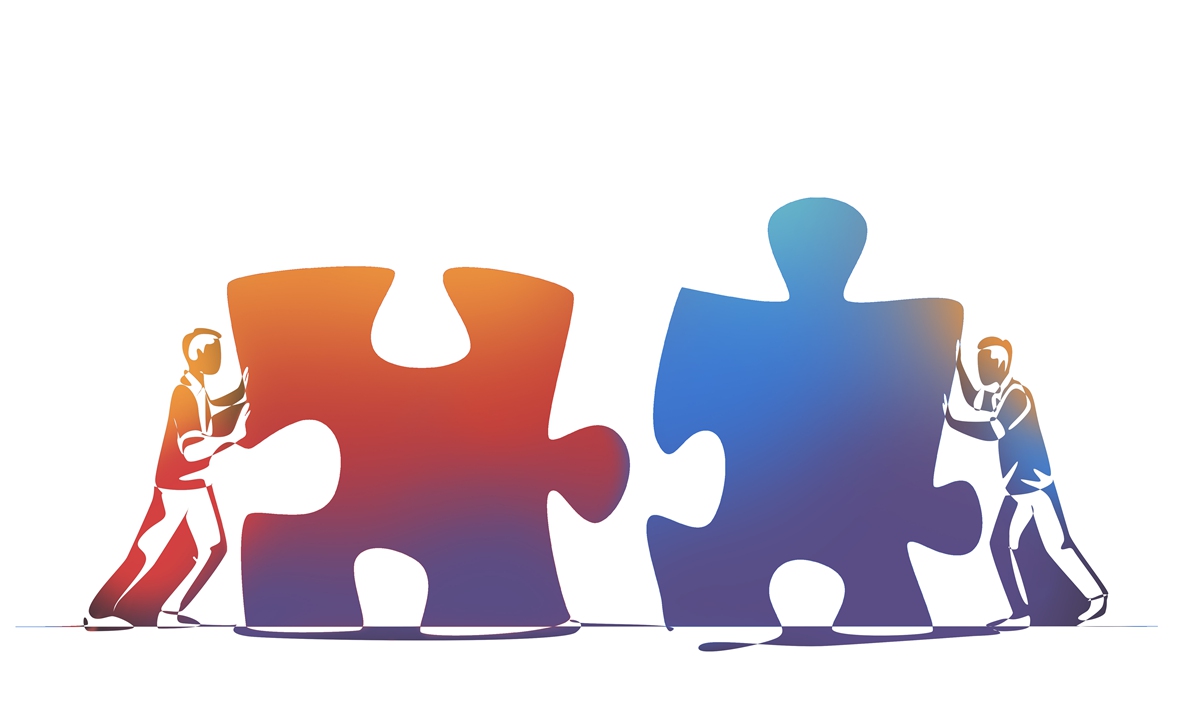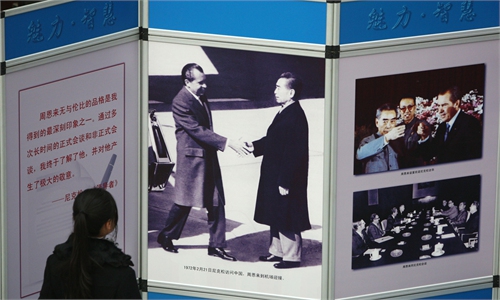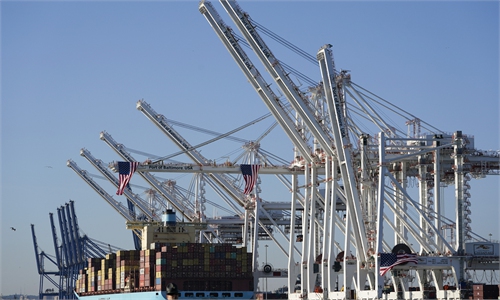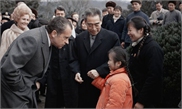
Photo:VCG
Editor's Note:Winston Lord (Lord), one of the architects of President Richard Nixon's efforts to forge ties with China, said he was "fortunate to be at the center of the whole intercourse." Lord, then assistant of Dr. Henry Kissinger, said he was the first American official to enter China more than 50 years ago and was grateful that the Chinese side recognized he was present at the Nixon-Mao meeting. He criticized the view that Nixon's trip 50 years ago and efforts to engage China are a mistake as "silly and revisionist." He shared his personal stories and historical details about Nixon's trip to China 50 years ago with Global Times reporter Yu Jincui in an exclusive interview. The following is the full transcript.
GT: Regarding President Nixon's trip to China, there are many comments about you. How do you define your role in Nixon's trip to China? What were you mainly in charge of?
Lord: I was very fortunate to be part of such an important geopolitical event, which took vision and courage by the leaders of both countries. I was involved from the very beginning. After 22 years of mutual hostility, we had to get in touch with each other and send signals that we wanted to have a new relationship.
I worked closely with Dr. Kissinger and President Nixon to get in touch with the Chinese side. Through Pakistan which was a mutual friend, we went on a secret trip, Dr. Kissinger, I, and a couple of others in July 1971. I was in charge of the briefing books for that. And we met Zhou Enlai, and we had good enough discussions. So both sides thought that a presidential visit would be in the interest of both countries. We went back again publicly to set up the president's visit in October 1971, began drafting the Shanghai Communiqué. And then we went, of course, in February 1972. And again, I was in charge of the president's briefing books, and I sat in all the meetings with chairman Mao and premier Zhou. And so I was fortunate to be at the center of the whole intercourse.
GT: You once told media that you've "never seen any president work as hard for a single event or trip as Nixon worked for this trip." Why do you think President Nixon paid so much attention to this visit? What did the visit mean to him and the US?
Lord: I was in charge of assembling the briefing books, getting information from all the government agencies. There were six big briefing books, and if you put one on top of the other, they'd probably be a foot high. And I know that Nixon read all the books because almost every page was marked up with his comments. And indeed, as we flew on Air Force One, in February 1972 toward China, he kept sending me messages to the back of the plane asking for more information.
He wanted to be very well prepared because he knew this was a momentous international event. He knew he was going to be speaking with the very forceful leaders in China. He wanted to be well prepared on Chinese history and culture as well as on various issues. You know he's been interested in China, had written an article in a magazine two years before he became president saying that we should not have China isolated from the world community. So for all these reasons - historic, US national interests and personal - he wanted to be fully informed as he met with the Chinese leaders.
The visit itself was of course a major event, not only with respect to relations between our two countries, but as for the US side, it had an immediate impact on the Soviet Union. It improved relations with Moscow immediately. They agreed to a summit, some arms control agreements and an agreement in Berlin. We got help from China and the Soviets on ending the Vietnam War. Also, it showed the world that America could act strongly on the world stage despite the Vietnam War.
It lifted the morale of the American people, which had a very fatiguing decade: the riots, assassinations and the war. So we achieved all our major objectives and the Chinese did as well. They had two major objectives. One was the balance of the threat they saw coming from the northern neighbor, the soviets. And secondly, to break out of China's diplomatic isolation. Indeed, they did get balance versus the Soviets. And after opening, China got into the United Nations and established diplomatic relations with Japan and other countries. So like the way the Chinese like to put it: It was a win-win situation.
GT: In order to facilitate Nixon's visit, you visited Beijing twice as Kissinger's assistant. One was Kissinger's secret visit to China, and the other was in October 1971. When you set foot on Chinese territory for the third time as a member of Nixon's delegation, were there any different feelings you had from the previous two visits?
Lord: By the time we went with the president in February 1972, we were confident that the visit would be a success. We still had difficult negotiations to finish the communiqué, particularly on the sensitive Taiwan issue. But the secret trip in July 1971, the public trip in October 1971, the preparations for the itinerary and for the agenda and drafting most of the Shanghai Communiqué, meant both sides clearly wanted to have success.
So all these trips were dramatic. The first one was more uncertain because we didn't know yet whether or not a trip would make sense, whether we could establish a new relationship. So that was dramatic as it was the first time that we went into China. In fact, I always claimed that I got to China before Dr. Kissinger, because as we flew from Pakistan on a Pakistani plane, no American official had been in China for 22 years. And as the plane got into Chinese airspace and territory, I was on the front, while Dr. Kissinger was on the back of the plane. So I got into China before he did. So that had drama, particularly extra drama for me.
My wife is Chinese, was born in Shanghai, so I was returning to the land of her birth. K2, the second-highest mountain of the world was outside our window, snowcapped in the morning. The secrecy, the James Bond aspect, the geopolitical earthquake that we were about to unleash -- for all these reasons, that trip had particular drama, but more uncertainty than the president's trip.
The public trip in October was designed to set up both the logistic and the substantive details of the visit. And that was also very interesting. We not only made more meetings with Zhou Enlai, but we went to a ballet, met some more cadres and a larger audience. And then we went to the summer palace to preview the president's visit and met a lot of Chinese tourists. So the Chinese side is very skillfully exposing the Chinese domestic audience in greater numbers to the Americans coming to China. So that visit was also exciting.
But the most dramatic was the president's trip and my secret attendance at the meeting between the chairman and the president, as well as the talks with Zhou Enlai.
GT: Can you describe the Mao-Nixon meeting? You were the note taker of that meeting. What impressed you most?
Lord: First, I should explain how I got there. Within an hour after we arrived, Zhou Enlai told the president Chairman Mao wanted to see him and we were surprised he would do with this so soon as usually, it would be at the end of a visit. But we were very pleased to show that the chairman was putting his stamp of approval on the visit at the very beginning.
But after the meeting, President Nixon told Zhou Enlai to cut me out of the photographs and the communiqué to keep my attendance secret. He did this because the secretary of state was not present. It was just Nixon, Kissinger, and myself. He didn't want to humiliate or embarrass the secretary by showing that a third person was at the meeting. And that was a young assistant to the national security adviser. I understood why he kept it a secret. I told my wife. But aside from her, the whole world thought that only Nixon and Kissinger were at the meeting. And in a later visit in February 1973, premier Zhou Enlai gave me a photograph of the Mao-Nixon meeting, proving that I was there secretly.
Now, as for the meeting itself, we were somewhat surprised, because we were already used to the elegant phrasing and somewhat longer presentations by Zhou Enlai - he's a charismatic mandarin leader, but with Mao, we got very short sentences, some humor, some self-deprecation. As he didn't want to engage in any detail on substance, he said that was up to the premier. Nixon kept trying to get him to talk about Vietnam, the Taiwan issue, the Soviet Union and Japan. The chairman would only give one or two sentences. So we were a little puzzled, but we recognized over the coming days as we had lengthy discussions with Zhou Enlai, that the chairman had very subtly and skillfully, but in very brief talks, indicated the basic Chinese positions on the key issues, and then Zhou Enlai could elaborate these over the coming days. It was sort of like an overture to a symphony.
GT: When premier Zhou gave you the photo, proving you were present when Nixon met Chairman Mao, how did you feel?
Lord: I was very grateful. Obviously, I was very excited and proud to be in that historic meeting, but I'm a human being, and I therefore was disappointed that the world didn't know I was there. And the Chinese recognized this and it was a very graceful note.
GT: Nixon's visit to China opened the door to China-US relations. Both sides have overcome great difficulties. Where do you think the difficulties lie? What were the main reasons for having overcome these difficulties?
Lord: At that time the major issue - and it's still an issue today - was Taiwan. And both sides had to meet in a compromise in order to make the visit a success. Nixon and Kissinger put forward a one-China policy, which met the Chinese needs for the Americans to move on this issue. But it was somewhat ambiguous so that it served our needs as well as China's needs.
Meanwhile, the Chinese had to make concessions on Taiwan, because we didn't switch diplomatic relations right away. We maintained our security arrangements. It was the courage of both sides to say, we're gonna have to postpone very tough issues like Taiwan.
Each side would maintain its principles in its position, but in order to get along in other areas of common agreement, we couldn't tackle this issue and try to solve it right away. So that principle still can apply today. We have a very difficult situation now. And the idea is to get as much stability into avoiding conflict as we can. One way to do that is to break the issues we have between us into three categories. There's one category that we can't solve immediately that we have to manage to make sure it doesn't draw us into the conflict that neither side wants. That includes Taiwan and human rights for example. Then there's another broad category where we can and should compete recognizing international rules and norms. In areas like economics and technology, there should be competition, but it should be peaceful.
And then there should be a third area where we can actually cooperate despite the tensions in our relationship. These are mostly global issues, like climate change, pandemics, non-proliferation. Here, both sides have an interest to solve these problems for their own national purposes, as well as global interests. And these areas of cooperation can provide some stability to our relationship while we tackle the more difficult issues elsewhere.
GT: There is a view in the US nowadays that Nixon's visit to China and the subsequent policy of engagement with China were both mistakes. What is your take on this?
Lord: That's a very shortsighted and mistaken view in my opinion. First, the United States, from its standpoint, achieved many objectives. As I mentioned above, they include opening up with 1/5 of the world's people, improving relations with the Soviet Union, helping to end the Vietnam War, showing that America was still strong on the international stage and improving the morale of the American people, even as China achieved its objectives. So it had an immediate positive impact on us and, ever since, we've gained from the relationship as well as had trouble. But the issue is, what was the alternative to engaging China? We couldn't contain it.
First, it's silly to think that a country with 4,000 years of history and the dynamism of the Chinese people would not be able to rise at some point. Maybe we helped speed it up. I would argue it was Deng Xiaoping's reforms and opening to the world that was the major factor in China becoming a regional and global power.
Secondly, what was the alternative? Containment was impossible because other countries wouldn't join us so it would be ineffective and might be dangerous, because we might stumble into conflicts.
Thirdly, we always hedged against the opening. We wanted to improve relations, but we weren't naïve. China had different national interests and ideologies. So we have maintained our alliances and military power. We pay increasing attention to Asia to balance Chinese influence. We got many advantages out of engagement, economic, cultural exchange, and working together on global issues. China helps us with global problems. And so we've gained, even as we've had some problems. So for all these reasons, the fact that there was no alternative, the fact that we always hedged, makes the view that this was a mistake silly and revisionist.



